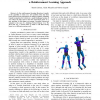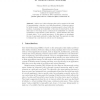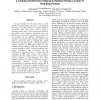1233 search results - page 31 / 247 » Feudal Reinforcement Learning |
ATAL
2005
Springer
14 years 1 months ago
2005
Springer
Reinforcement learning problems are commonly tackled with temporal difference methods, which use dynamic programming and statistical sampling to estimate the long-term value of ta...
GECCO
2005
Springer
14 years 1 months ago
2005
Springer
Recurrent neural networks are theoretically capable of learning complex temporal sequences, but training them through gradient-descent is too slow and unstable for practical use i...
ICRA
2009
IEEE
14 years 2 months ago
2009
IEEE
— In the reinforcement learning literature, transfer is the capability to reuse on a new problem what has been learnt from previous experiences on similar problems. Adapting tran...
ICCBR
2005
Springer
14 years 1 months ago
2005
Springer
CBR is one of the techniques that can be applied to the task of approximating a function over high-dimensional, continuous spaces. In Reinforcement Learning systems a learning agen...
JDCTA
2010
13 years 2 months ago
2010
To gain insights into the neural basis of such adaptive decision-making processes, we investigated the nature of learning process in humans playing a competitive game with binary ...



